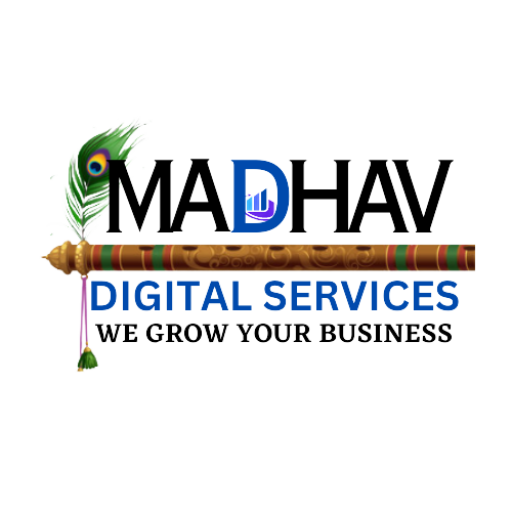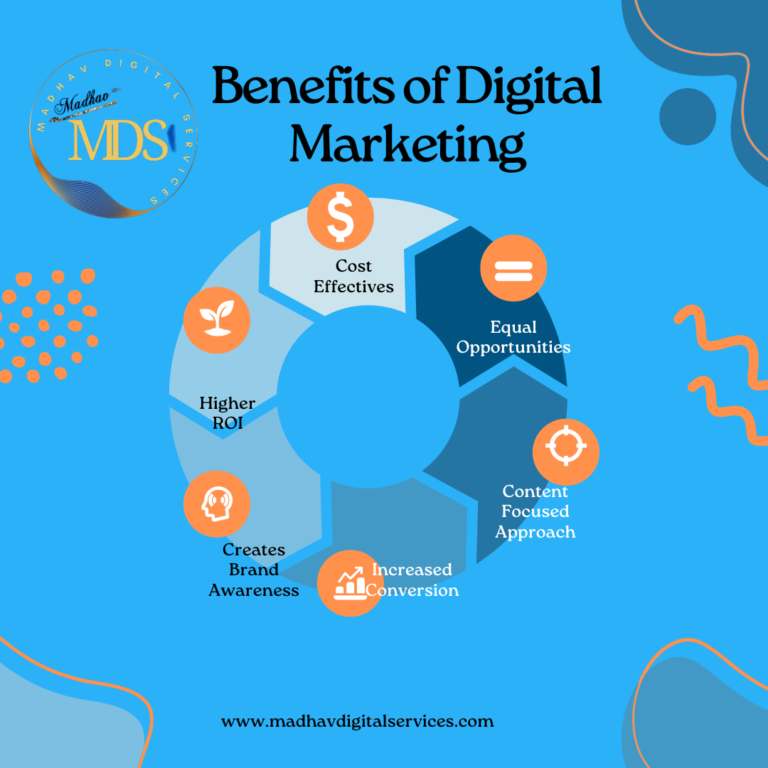Online Marketing: The Who, What, Why, & How of Digital Market
In the digital age, effective online marketing is essential for any business looking to thrive. At Madhav Digital Services, we specialize in harnessing the power of digital marketing to help businesses grow. This comprehensive guide will explore the who, what, why, and how of digital marketing, using key strategies such as SEO, SMM, SMO, and Google Ads to drive success.

Who Needs Digital Marketing?
Digital marketing is crucial for businesses of all sizes and industries. Whether you’re a small startup or a large corporation, having a robust online presence is necessary to compete in today’s market. Here are some key groups that benefit from digital marketing:
1. Small Businesses
Small businesses need digital marketing to increase their visibility and attract local customers. Techniques such as local SEO and targeted Google Ads campaigns can significantly enhance their reach.
2. E-commerce Stores
For e-commerce businesses, digital marketing is vital to drive website traffic, convert visitors into customers, and retain those customers. SEO, SMM, and Google Ads are crucial in achieving these goals.
3. Service Providers
Service-based businesses, such as law firms, healthcare providers, and consultants, use digital marketing to build credibility and attract clients. A strong online presence through SEO and social media can establish trust and authority.
4. B2B Companies
Business-to-business (B2B) companies use digital marketing to generate leads and build relationships with other businesses. LinkedIn marketing, content marketing, and targeted ads are particularly effective in this sector.
What is Digital Marketing?
Digital marketing encompasses all marketing efforts that use an electronic device or the internet. At Madhav Digital Services, we employ various strategies to help businesses succeed online. Key components of digital marketing include:
1. Search Engine Optimization (SEO)
SEO is the process of optimizing your website to rank higher in search engine results pages (SERPs). This increases your visibility and drives organic traffic to your site. Key aspects of SEO include keyword research, on-page optimization, and link building.
2. Social Media Marketing (SMM)
SMM involves using social media platforms to promote your business. This includes creating and sharing content, running paid ads, and engaging with your audience. Effective SMM can boost brand awareness, drive traffic, and generate leads.
3. Social Media Optimization (SMO)
SMO is the process of optimizing your social media profiles and content to increase visibility and engagement. This includes optimizing profile information, using relevant hashtags, and sharing content that encourages interaction.
4. Google Ads
Google Ads is a paid advertising platform that allows you to display ads on Google’s search engine and other properties. By targeting specific keywords and demographics, you can drive targeted traffic to your website and achieve measurable results.
5. Content Marketing
Content marketing involves creating valuable, relevant content to attract and engage your target audience. This can include blog posts, videos, infographics, and more. Quality content helps build trust with your audience and supports SEO efforts.
6. Email Marketing
Email marketing is the practice of sending targeted emails to your audience. It’s an effective way to nurture leads, build relationships, and drive conversions. Personalization and automation are key to successful email marketing campaigns.
Why is Digital Marketing Important?
Digital marketing is essential for several reasons:
1. Reach a Wider Audience
Traditional marketing methods are limited in scope and can be costly. Madhav Digital marketing allows you to reach a global audience at a fraction of the cost, ensuring your message gets to the right people.
2. Target Specific Audiences
With Madhav digital marketing, you can target specific demographics, interests, and behaviors. This precision ensures that your marketing efforts are focused on individuals most likely to be interested in your products or services.
3. Measure Results
Digital marketing provides measurable results. Tools like Google Analytics and social media insights allow you to track the performance of your campaigns and make data-driven decisions.
4. Enhance Engagement
Engagement is crucial for building relationships with your audience. Madhav Digital marketing strategies like social media marketing and email marketing allow you to interact with your customers, fostering loyalty and trust.
5. Stay Competitive
In today’s digital world, businesses that do not have a strong online presence risk being overshadowed by competitors. Digital marketing helps you stay competitive and relevant in your industry.
How to Implement Digital Marketing
Implementing a successful digital marketing strategy involves several steps:
1. Define Your Goals
Start by setting clear, measurable goals. These could include increasing website traffic, generating leads, boosting sales, or enhancing brand awareness.
2. Understand Your Audience
Knowing your target audience is crucial. Conduct market research to understand their needs, preferences, and behaviors. This information will guide your marketing strategies.
3. Develop a Comprehensive Strategy
Your digital marketing strategy should include a mix of SEO, SMM, SMO, Google Ads, and content marketing. Each component should work together to achieve your overall goals.
4. Optimize Your Website
Your website is the foundation of your online presence. Ensure it is user-friendly, mobile-responsive, and optimized for search engines. Quality content, fast loading times, and easy navigation are essential.
5. Implement SEO Best Practices
Optimize your website’s on-page elements, such as title tags, meta descriptions, and header tags, using relevant keywords. Build high-quality backlinks and ensure your site is technically sound.
6. Leverage Social Media
Create engaging content tailored to each social media platform. Use paid ads to reach a broader audience and engage with your followers regularly to build a loyal community.
7. Run Targeted Google Ads Campaigns
Create targeted ads that align with your audience’s search intent. Use A/B testing to refine your ads and improve their performance. Monitor your campaigns and adjust your strategies based on the data.
8. Create Valuable Content
Produce high-quality, relevant content that addresses your audience’s needs and interests. Use various formats, such as blog posts, videos, and infographics, to keep your audience engaged.
9. Utilize Email Marketing
Build an email list and segment it based on customer behavior and preferences. Send personalized, valuable content to nurture leads and drive conversions. Use automation to streamline your email marketing efforts.
10. Analyze and Adjust
Regularly review your digital marketing performance using analytics tools. Identify what’s working and what’s not, and adjust your strategies accordingly. Continuous optimization is key to long-term success.
Conclusion
Digital marketing is a dynamic and essential component of modern business strategy. By understanding the who, what, why, and how of digital marketing, you can effectively leverage SEO, SMM, SMO, and Google Ads to drive traffic, engage your audience, and achieve your business goals. At Madhav Digital Services, we are committed to helping you navigate the complexities of digital marketing and unlock your business’s full potential. Contact us today to start your journey toward digital success.

